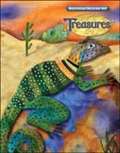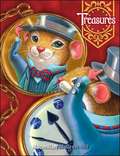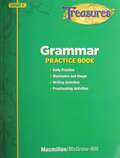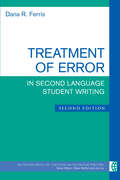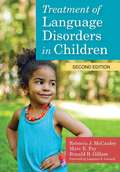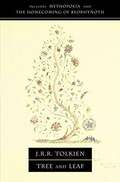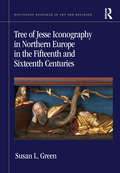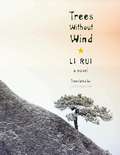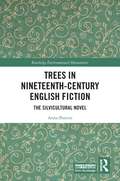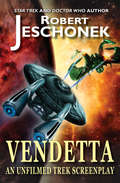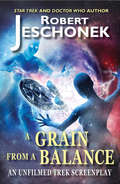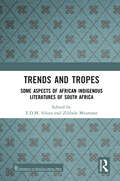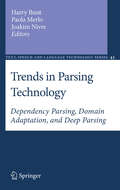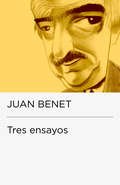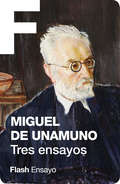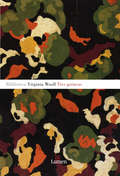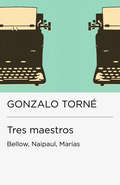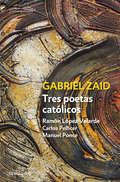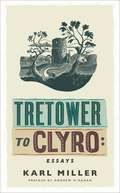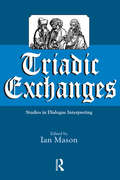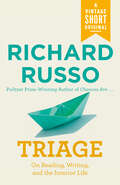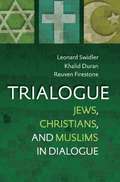- Table View
- List View
Treasures 4th Grade
by Diane August Donald R. Bear Janice A. DoleA Reading/Language Arts Program 4th Grade
Treasures: A Reading/Language Arts Program
by Jana Echevarria Donald R. Bear Janice A. Dole Jan E. Hasbrouck Scott G. Paris Timothy Shanahan Josefina V. TinajeroA Reading/Language Arts Program
Treasures: A Reading/Language Arts Program (Elementary Reading Treasures Series)
by McGraw-Hill StaffMcGraw-Hill Education. Hardcover. Condition: Fair. A readable copy. All pages are intact, and the cover is intact.
Treasury of Children's Literature
by Margaret E. MartignoniMother Goose, Grimm's fairy tales, excerpts from The Wind in the Willows, Heidi, and many others can be found in this collection of children's literature. It is designed to be a book parents can read to their children, and you could read from it for weeks without repeating yourself.
Treatment of Error in Second Language Student Writing, Second Edition
by Ferris Dana R.Treatment of Error offers a realistic, well-reasoned account of what teachers of multilingual writers need to know about error and how to put what they know to use. As in the first edition, Ferris again persuasively addresses the fundamental error treatment questions that plague novice and expert writing specialists alike: What types of errors should teachers respond to? When should we respond to them? What are the most efficacious ways of responding to them? And ultimately, what role should error treatment play in the teaching of the process of writing? The second edition improves upon the first by exploring changes in the field since 2002, such as the growing diversity in what is called L2 writers, the blurring boundaries between native and non-native speakers of English, the influence of genre studies and corpus linguistics on the teaching of writing, and the need the move beyond error to second language development in terms of approaching students and their texts. It also explores what teacher preparation programs need to do to train teachers to treat student error. The second edition features * an updating of the literature in all chapters * a new chapter on academic language development * a postscript on how to integrate error treatment/language development suggestions in Chapters 4-6 into a writing class syllabus * the addition of discussion/analysis questions at the end of each chapter, plus suggested readings, to make the book more useful in pedagogy or teacher development workshops"
Treatment of Language Disorders in Children (Second Edition)
by Alan G. Kamhi Marc E. Fey<p>Thoroughly updated to meet the needs of today's students in SLP courses, the second edition of this classic textbook prepares future professionals to evaluate, compare, select, and apply effective interventions for language disorders in children. Using realistic case studies and many new video clips that show each strategy in action, the expert contributors introduce your students to 14 current, research-based intervention models and examine practical ways to apply them in the field. <p>The new edition covers interventions for both emerging communication and language and more advanced language and literacy, in a consistent chapter format that makes it easy for students to compare treatment approaches. A textbook SLPs will keep and reference often throughout their careers, this balanced, in-depth look at interventions will prepare professionals to choose and implement the best interventions for children with language disorders.</p>
Tree And Leaf
by J. R. R. Tolkien Christopher TolkienTree and Leaf is a small book published in 1964, containing two works by J. R. R. Tolkien: a revised version of an essay called "On Fairy-Stories" an allegorical short story called "Leaf by Niggle".
Tree of Jesse Iconography in Northern Europe in the Fifteenth and Sixteenth Centuries (Routledge Research in Art and Religion)
by Susan L. GreenThis book is the first detailed investigation to focus on the late medieval use of Tree of Jesse imagery, traditionally a representation of the genealogical tree of Christ. In northern Europe, from the mid-fifteenth to the early sixteenth centuries, it could be found across a wide range of media. Yet, as this book vividly illustrates, it had evolved beyond a simple genealogy into something more complex, which could be modified to satisfy specific religious requirements. It was also able to function on a more temporal level, reflecting not only a clerical preoccupation with a sense of communal identity, but a more general interest in displaying a family’s heritage, continuity and/or social status. It is this dynamic and polyvalent element that makes the subject so fascinating.
Trees Without Wind: A Novel (Weatherhead Books on Asia)
by Rui LiUnfolding in the tense years of the Cultural Revolution (1966–1976), Trees Without Wind takes place in a remote Shanxi village in which a rare affliction has left the residents physically stunted. Director Liu, an older revolutionary and local commune head, becomes embroiled in a power struggle with Zhang Weiguo, a young ideologue who believes he is the model of a true revolutionary. Complicating matters is a woman named Nuanyu, who, like Zhang Weiguo and Director Liu, is an outsider untouched by the village's disease. "Wedded" to all of the male villagers, Nuanyu lives a polyandrous lifestyle based on necessity and at odds with the puritanical idealism of the Cultural Revolution. The deformed villagers, representing the manipulated masses of China, become pawns in the Party representatives' factional infighting. Director Liu and Zhang Weiguo's explosive tug-of-war is part of a larger battle among politics, self-interest, and passion gripping a world undone by ideological extremism. A collectively told narrative powered by distinctive subjectivities, Trees Without Wind is a milestone in the fictional treatment of a horrific event.
Trees in Nineteenth-Century English Fiction: The Silvicultural Novel (Routledge Environmental Humanities)
by Anna BurtonThis is a book about a longstanding network of writers and writings that celebrate the aesthetic, socio-political, scientific, ecological, geographical, and historical value of trees and tree spaces in the landscape; and it is a study of the effect of this tree-writing upon the novel form in the long nineteenth century. Trees in Nineteenth-Century English Fiction: The Silvicultural Novel identifies the picturesque thinker William Gilpin as a significant influence in this literary and environmental tradition. Remarks on Forest Scenery (1791) is formed by Gilpin’s own observations of trees, forests, and his New Forest home specifically; but it is also the product of tree-stories collected from ‘travellers and historians’ that came before him. This study tracks the impact of this accumulating arboreal discourse upon nineteenth-century environmental writers such as John Claudius Loudon, Jacob George Strutt, William Howitt, and Mary Roberts, and its influence on varied dialogues surrounding natural history, agriculture, landscaping, deforestation, and public health. Building upon this concept of an ongoing silvicultural discussion, the monograph examines how novelists in the realist mode engage with this discourse and use their understanding of arboreal space and its cultural worth in order to transform their own fictional environments. Through their novelistic framing of single trees, clumps, forests, ancient woodlands, and man-made plantations, Jane Austen, Elizabeth Gaskell, and Thomas Hardy feature as authors of particular interest. Collectively, in their environmental representations, these novelists engage with a broad range of silvicultural conversation in their writing of space at the beginning, middle, and end of the nineteenth century. This book will be of great interest to students, researchers, and academics working in the environmental humanities, long nineteenth-century literature, nature writing and environmental literature, environmental history, ecocriticism, and literature and science scholarship.
Trek Script 2
by Robert T. JeschonekOnce upon a galaxy, a spaced-out writer launched a script for a starry TV episode set in a universe much like a certain trek we know and love. Here, for the first time, you can experience this voyage into trekkerness. The names are new, but you might recognize the drama and excitement of an epic encounter aboard the star cruiser Sojourner in a distant quadrant of the final frontier. In this deep space adventure, an alien warlord seeks revenge against the Sojourner crew, claiming he knows and hates them well--but they've never even met him before! When a member of the crew goes rogue and jumps ship, his actions might just set an impossible chain of events in motion. Can Captain Jamison and her embattled crew change the destiny of destruction that awaits them all? Don't miss this exciting lost script by award-winning Star Trek author Robert T. Jeschonek, a master of unique and unexpected science fiction that really packs a punch. He won the Grand Prize in the nationwide Star Trek: Strange New Worlds competition and has written official Star Trek fiction in the realms of the original series, The Next Generation, Voyager, and even New Frontier. He also writes for Star Trek Magazine.
Trek Script!
by Robert T. JeschonekOnce upon a galaxy, a spaced-out writer launched a script for a starry TV episode set in a universe much like a certain trek we know and love. Here, for the first time, you can experience this adventure of the next generation of trekkers. The names are new, but you might recognize the drama and excitement of an epic encounter aboard the star cruiser Infinitude on the final frontier. When alien lifeforms offer the ultimate exploration of space and time, will the crew discover their deadly secret? Or will the aliens' seductive persuasion change the lives of the crew members forever? Don't miss this exciting lost script by award-winning Star Trek author Robert T. Jeschonek, a master of unique and unexpected science fiction that really packs a punch. He won the Grand Prize in the nationwide Star Trek: Strange New Worlds competition and has written official Star Trek fiction in the realms of the original series, The Next Generation, Voyager, and even New Frontier. He also writes for Star Trek Magazine.
Trends And Tropes: Some Aspects of African Indigenous Literatures of South Africa
by E.D.M. Sibiya Zilibele MtumaneThis collection explores topical and current issues in indigenous African language literature of South Africa. These include narratological elements of literature, language usage, poetry analysis, and song lyrics. Each scholar presents findings that are particular to their research, thus making the book a valuable source of knowledge penned in a diversity of writing styles across different literary genres.Seventy per cent of the chapters are written in English and thirty per cent in isiZulu, a gesture towards encouraging research presentations in indigenous languages. Also of interest is that the chapter content covers traditional or largely obsolete forms such as folklore and essays.Print edition not for sale in Sub Saharan Africa.
Trends in Parsing Technology
by Harry Bunt Joakim Nivre Paola MerloComputer parsing technology, which breaks down complex linguistic structures into their constituent parts, is a key research area in the automatic processing of human language. This volume is a collection of contributions from leading researchers in the field of natural language processing technology, each of whom detail their recent work which includes new techniques as well as results. The book presents an overview of the state of the art in current research into parsing technologies, focusing on three important themes: dependency parsing, domain adaptation, and deep parsing. The technology, which has a variety of practical uses, is especially concerned with the methods, tools and software that can be used to parse automatically. Applications include extracting information from free text or speech, question answering, speech recognition and comprehension, recommender systems, machine translation, and automatic summarization. New developments in the area of parsing technology are thus widely applicable, and researchers and professionals from a number of fields will find the material here required reading. As well as the other four volumes on parsing technology in this series this book has a breadth of coverage that makes it suitable both as an overview of the field for graduate students, and as a reference for established researchers in computational linguistics, artificial intelligence, computer science, language engineering, information science, and cognitive science. It will also be of interest to designers, developers, and advanced users of natural language processing systems, including applications such as spoken dialogue, text mining, multimodal human-computer interaction, and semantic web technology.
Tres ensayos (Colección Endebate #Volumen)
by Juan BenetTres deslumbrantes ensayos donde relucen la inteligencia y el dominio del lenguaje de Juan Benet. Juan Benet es la mejor prosa castellana al servicio de una inteligencia deslumbrante. La mejor prueba de ello son estos tres magníficos ensayos: «Valedictoria a Dionisio», un elogio a Dionisio Ridruejo, maestro y amigo; y dos reflexiones sobre la clase política española en los albores de la Transición, «El tonto de la familia» y «Fisiología del pasillo». Una pequeña dosis de un grande de las letras.
Tres ensayos: Adentro! La Ideocis; La Fe (Flash Ensayo #Volumen)
by Miguel De UnamunoTres ensayos del célebre intelectual Miguel de Unamuno que representan la esencia de su pensamiento. Miguel de Unamuno fue un pensador inconformista que vivió en continua lucha contra su contexto histórico. <P><P>Los tres ensayos recogidos aquí, «Civilización y cultura», «La crisis del patriotismo» y «Sobre la consecuencia, la sinceridad» son una muestra de la gran lucidez de su pensamiento, y de los temas que le preocuparon a lo largo de su vida: el destino de la humanidad, el dilema entre lo individual y lo colectivo y la identidad nacional. <P>En «Civilización y cultura» Unamuno reconoce el valor de la historia, que se despliega desde los orígenes del hombre y llega hasta nuestros días, creando culturas y civilizaciones. «La crisis del patriotismo» plantea una nueva idea de patria en España, algo que se discutía en aquella época. <P><P> El intelectual defendió siempre un patriotismo español que respetase las particularidades de cada uno de sus pueblos y que los uniese en libertad, dejando a cada pueblo «desarrollarse según él es». <P> En «Sobre la consecuencia, la sinceridad» Unamuno contrasta su yo interior al yo social para examinar el problema del subjetivismo: cómo nos vemos, cómo somos realmente y cómo nos ven los demás. <P>Unamuno cita a Walt Whitman para destacar que cada persona es varias personas a la vez, alberga multitudes, y se encuentra en constante contradicción con el mundo que le rodea.
Tres guineas (Bolsillo Ser.)
by Virginia WoolfMe desagrada dejar sin contestación una carta tan notable como la suya, una carta que quizá sea única en la historia de la humana correspondencia, pues ¿cuándo se ha dado el caso, anteriormente, de que un hombre culto pregunte a una mujer cuál es la manera, en su opinión, de evitar la guerra? Así empieza este espléndido ensayo de Virginia Woolf, planteado como repuesta a las preguntas de un caballero que pedía su opinión sobre las maneras de evitar la Segunda Guerra Mundial. Como era habitual en ella, la gran autora aprovecha esta ocasión para analizar en profundidad la discriminación de que era víctima la mujer y reivindicar el derecho a tener la misma educación y oportunidades profesionales que el hombre. Solo así se llegaría a la realidad de un mundo racional y pacífico, donde una dama podría contestar libremente a cualquier pregunta. Setenta y cinco años después de su primera publicación, Tres guineas, que puede leerse como una elaboración de los temasya planteados en Un cuarto propio, es un texto que aun se disfruta con placer e interés, y no solo por la espléndida prosa de Virginia Woolf, sino también por su vigencia: si es verdad que hoy en día las mujeres en Occidente hablan y opinan, la voz que las oye aun es la de un caballero que no ha aprendido a escuchar.
Tres maestros: Bellow, Naipaul, Marías (Colección Endebate #Volumen)
by Gonzalo TornéLas lecciones fundamentales de tres clásicos de la literatura contemporánea. Saul Bellow, Sir Vidia Naipaul y Javier Marías son tres autores tan distintos como claves para entender la novela en la segunda mitad del siglo XX. En tres ensayos recorridos por la misma admiración inteligente, Gonzalo Torné, uno de los escritores más interesantes del panorama actual, desentraña los motivos por lo que todo lector que se precie debe colocar encima de la pila novelas como Las aventuras de Augie March, Un recodo en el río o Corazón tan blanco.
Tres poetas católicos: Ramón López Velarde, Carlos Pellicer y Manuel Ponce
by Gabriel ZaidPara los juicios convencionales, López Velarde es el cantor de la provincia y de la “íntima tristeza reaccionaria”; Pellicer, el cantor del trópico y “las manos llenas de color”; Ponce, un sacerdote que hacía versos. Pero hay que verlos como miembros de una tribu cuyo contexto se perdió: los poetas y artistas que creyeron posible ser católicos y modernos. El sueño de crear una cultura católica moderna fracasó hasta el punto de que ni siquiera es historiado, de que la tradición crítica recibida no tiene una precaución que diga: hay cosas de la cultura mexicana que nunca entenderás, si ignoras que el catolicismo mexicano soñó con la modernidad. De Gabriel Zaid hemos publicado casi todos sus libros en esta colección.
Tretower to Clyro
by Karl MillerKarl Miller is one of the greatest literary critics of the last fifty years, the founder of the London Review of Books and Lord Northcliffe Professor of Modern English Literature at University College, London. In this last book of essays he turns his attention to appreciate certain writers of the English-speaking modern world. Most of them are inhabitants of the North Sea archipelago once known as Great Britain, who are here seen as tribally distinct, as Scottish, English, Irish or Welsh, and as a single society. A new ruralism has come to notice in this country, and the book is drawn to country lives as they have figured in the literature of the last century. b bAn introductory essay is centred on the Anglo-Welsh borderlands. Journeys taken with Seamus Heaney and Andrew O'Hagan to this countryside, and others, are threaded throughout the book. The poets Heaney and Ted Hughes are discussed, together with the fiction of Ian McEwan, the Canadian writer Alistair Macleod, the Irish writer John McGahern and the Baltimorean Anne Tyler. Scotland is a preoccupation of the later pieces, including the letters of Henry Cockburn, a lifelong interest of the author, who is also interested here in foxes and their current metropolitan profile.
Triadic Exchanges: Studies in Dialogue Interpreting
by Ian MasonDialogue interpreting is a generic term covering a diverse range of fields of interpreting which have in common the basic feature of face-to-face interaction between three parties: the interpreter and (at least) two other speakers. The interaction consists of spontaneous dialogue, involving relatively short turns at talk, in two languages. It is usually goal-directed in the sense that there is some outcome to be negotiated. The studies in this volume cover several different fields: courtroom interpreting, doctor-patient interviews, immigration interviews, etc., and involve a range of different languages: Spanish, Portuguese, Polish, More and Austrian Sign Language. They have in common that they view the interpreter as just one of the parties to this three-way exchange, in which each participant's moves can affect each other participant and thus the outcome of the event. In Part I, new research directions are explored in studies which piece together evidence of the ways dialogue interpreters actually behave and the effects of their behaviour. This is followed by two studies which discuss traditional interpreter roles - the 'King's Linguist' in Burkina Faso and the Oranda Tsûji, official interpreters employed in isolationist eighteenth-century Japan to ensure contact with the outside world. Finally, issues involved in training are the subject of two chapters relating to Austria and the UK. The variety of aspects and approaches represented in the volume - linguistic, cultural, pragmatic, historical - offer a rich and fascinating overview of the field of dialogue interpreting studies as it now stands.
Triage: On Reading, Writing, and the Interior Life (A Vintage Short)
by Richard RussoA Vintage Shorts Nonfiction Original One of the most valuable spaces for an artist is the inner life—the sacred place where, outside of the constraints of time and space, meaning is extracted from raw experience and fashioned into art. In this timely new essay, Pulitzer Prize-winning author Richard Russo discusses the work writers do as they sift through experience and work to cultivate rich interior lives. For authors, this often involves performing triage, a constant assessment of events that helps determine what&’s useful for a story and potentially enduring. But what is at stake when we perform triage? Is an artist&’s interior life an act of generosity or selfishness? Reflecting on a year of reading and meditations on the nature of interiority brought up by a global pandemic and orders to stay at home, Triage is a candid and arresting look at the process that goes into creative work, by one of our most celebrated and bestselling novelists. An ebook short.
Trialogue: Jews, Christians, and Muslims in Dialogue
by Leonard Swidler Reuven Firestone Kalid DuranAuthor Leonard Swidler himself is one of the American originators of the term trialogue (words among three persons), and here he raises it to a new level as he shares the podium with professors Reuven Firestone and Khalid Duran. These three professors, beginning with Firestone and Judaism, present their faith traditions and the challenges as well as possibilities for genuine trialogue. Each offers invaluable insights into the ways they share Hebraic roots and Abrahamic traditions and how their beliefs and practices have evolved through the centuries up to and including the present. Throughout the text, readers are encouraged to pause for reflection and/or discussion of the key points presented by the authors. This is a fascinating, enlightening, and highly recommended introduction to these three great faith traditions and how they evolved and are practiced today.
